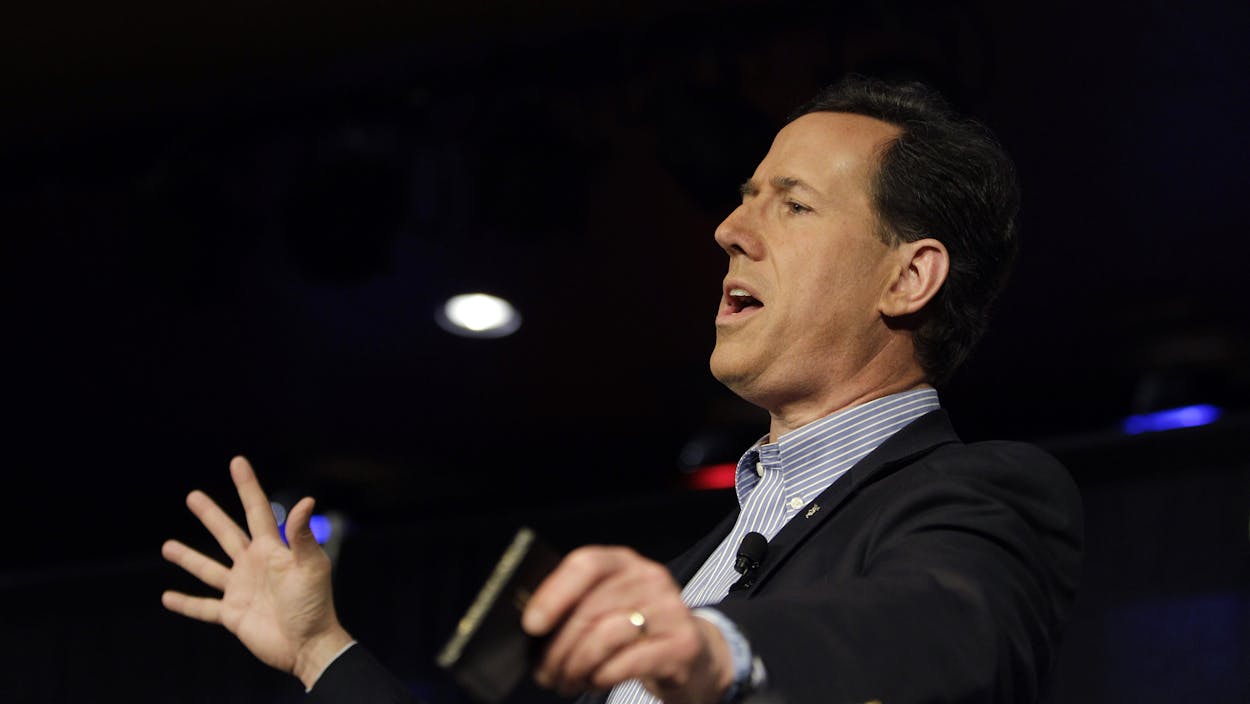At one point during the redistricting battle, legislators felt it was important that Texas keep its March 6 primary–even if meant having split elections, an expensive proposition–so that the state’s Republican voters could influence the presidential nomination on what’s known as “Super Tuesday,” presumably to help Rick Perry.
“For Gov. Rick Perry’s presidential campaign an early primary is paramount,” wrote Tim Eaton of the Austin American-Statesman on December 15. “A solid showing in Texas on March 6 could bolster his campaign with a large number of delegates from the state.”
Oops!
But it turns out a social conservative named “Rick” still needs help from Texas, and the way things have been going in this presidential campaign, our state’s new May 29 primary date may not be too late.
Likely Republican voters surveyed for last week’s University of Texas/Texas Tribune poll (PDF) overwhelmingly preferred Rick Santorum in the presidential race, with 48 percent choosing the former Pennsylvania senator. Former Speaker of the House (and Perry pick) Newt Gingrich was second with seventeen percent, followed by former Massachusetts governor Mitt Romney with sixteen percent (home-field advantage doesn’t mean much for Ron Paul, who came in fourth with fourteen percent).
Coming off his two primary wins in Michigan and Arizona, Romney leads Santorum in a new national Rasmussen Reports poll, forty percent to 24 percent, but Santorum led that same poll, 39 percent to 27 percent, just two weeks ago, right after he won Missouri, Minnesota, and Colorado. So things could change again right after Super Tuesday, and then again throughout the next two months.
That being the case, Victoria M. DeFrancesco Soto of the Nation suggests that Texas won’t just have a say, but could join California as the most important final battles. Wrote DeFrancesco Soto, in a piece that’s headlined “Romney’s Last Stand at the Alamo”:
There are four more months of primary elections and there are still 2,002 delegates up for grabs. To begin, Super Tuesday is not that super, with only 437 delegates at play. Delegate distribution will be interspersed throughout the contests, with the last month of the primary election season seeing 494 delegates in play. Almost one-third of these delegates will be from Texas, and Texans are not that sweet on Romney…Because of the number of delegates, the late date and Santorum’s overwhelming lead, the Lone Star state could be a game-changer.
DeFrancesco Soto goes on to speculate that Romney won’t do well enough on Super Tuesday or in any future Southern primaries to have locked up anything before Texas, and that in both Texas and the Southern states, Romney’s Mormonism hurts him (in that same UT/Tribune poll, only forty percent of those surveyed answered “Yes” to the question, “Do you believe that Mormons are Christians?”).
Her conclusion:
If Santorum picks up momentum in Texas at the end of May, he positions himself well for the June 5 California primary with 172 delegates. The RealClearPolitics polling average for the California primary has Romney ahead at 32 percent, with Santorum at 28 percent. California could be especially good for Santorum, since it is unlikely that he would have to give up much of the conservative vote to Gingrich.
Texas will cap off the Southern primary elections, where Santorum’s brand of conservatism and Romney’s Mormon faith could prove a dangerous combination for Romney. Timing is everything, and for Santorum the timing of Texas’s primary is on his side.
- More About:
- Politics & Policy
- Rick Santorum
- Mitt Romney







